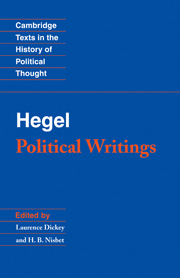Book contents
- Frontmatter
- Contents
- Editors' note
- General introduction
- Chronology of Hegel's life and career
- Translator's preface
- List of abbreviations
- The Texts
- The Magistrates should be Elected by the People (1798)
- The German Constitution (1798–1802)
- On the Scientific Ways of Treating Natural Law, on its Place in Practical Philosophy, and its Relation to the Positive Sciences of Right (1802–1803)
- Inaugural Address, Delivered at the University of Berlin (22 October 1818)
- Address on the Tercentenary of the Submission of the Augsburg Confession (25 June 1830)
- Lectures on the Philosophy of History (1827–1831)
- The Relationship of Religion to the State (1831)
- On the English Reform Bill (1831)
- Editorial notes
- Glossary
- Bibliography of works cited in this edition
- Index of names
- Index of subjects
- Cambridge Texts in the History of Political Thought
The German Constitution (1798–1802)
Published online by Cambridge University Press: 05 June 2012
- Frontmatter
- Contents
- Editors' note
- General introduction
- Chronology of Hegel's life and career
- Translator's preface
- List of abbreviations
- The Texts
- The Magistrates should be Elected by the People (1798)
- The German Constitution (1798–1802)
- On the Scientific Ways of Treating Natural Law, on its Place in Practical Philosophy, and its Relation to the Positive Sciences of Right (1802–1803)
- Inaugural Address, Delivered at the University of Berlin (22 October 1818)
- Address on the Tercentenary of the Submission of the Augsburg Confession (25 June 1830)
- Lectures on the Philosophy of History (1827–1831)
- The Relationship of Religion to the State (1831)
- On the English Reform Bill (1831)
- Editorial notes
- Glossary
- Bibliography of works cited in this edition
- Index of names
- Index of subjects
- Cambridge Texts in the History of Political Thought
Summary
[Introduction]
Germany is no longer a state. The older teachers of constitutional law had the idea of a science in mind when they dealt with the constitutional law of Germany, and they accordingly set out to specify a concept of the German constitution. But they could not reach agreement on this concept, and their modern counterparts finally gave up looking for it. The latter no longer treat constitutional law as a science, but as a description of what is present empirically without conforming to a rational Idea; and they believe that it is only in name that they can describe the German state as an empire or body politic.
There is no longer any argument about which concept the German constitution falls under. What can no longer be related to a concept [begriffen] no longer exists. If Germany were supposed to be a state, we could only describe the present condition of the state's dissolution as anarchy (as a foreign scholar of constitutional law did), were it not that the parts have reconstituted themselves into states which have retained a semblance of unity, derived not so much from a bond which still exists as from the memory of an earlier one. In the same way, fallen fruit can be seen to have belonged to a particular tree because it lies beneath its branches; but neither its position beneath the tree nor the shade which the tree casts over it can save it from decomposition and from the power of the elements to which it now belongs.
- Type
- Chapter
- Information
- Hegel: Political Writings , pp. 6 - 101Publisher: Cambridge University PressPrint publication year: 1999
- 3
- Cited by



